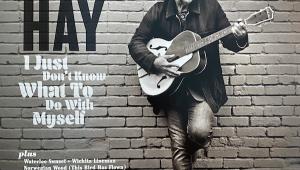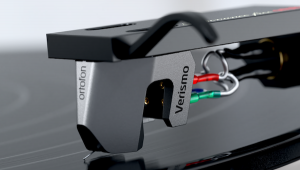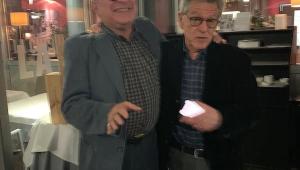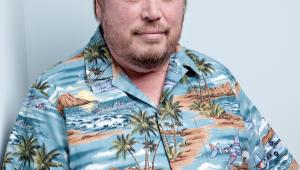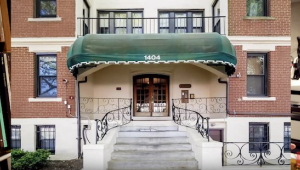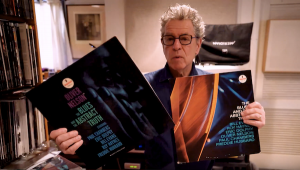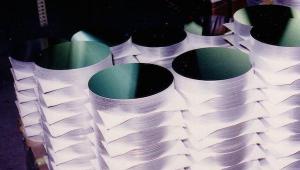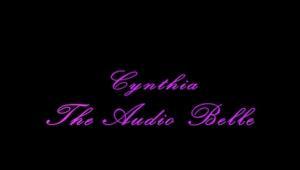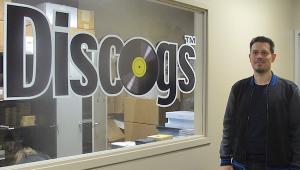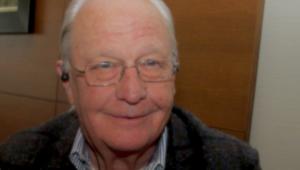Byrds Expert John Nork Interviews Chris Hillman Interview Part 2

TA: You probably don't remember this, Chris, but when I interviewed you and Roger in 1977, way back when you were in Miami, I asked you guys why you didn't call yourselves The Byrds when you were in McGuinn, Clark and Hillman, and you said that you promised you wouldn't unless David were there, and I said, "What did he do? Threaten to write more 'Mind Gardens'?" and everyone got a good yuk out of that.
CH: (laughs).
TA: What about "Hey Joe?"
CH: Well, that's okay. I think that David did it really good, but I don't remember. I think that I don't take it as seriously because the Lees, kind of this Byrds-clone, put it out.
TA: They had a fairly big hit with that, in fact.
CH: I think they heard us do it live. It was one of David's songs he always did. David probably did that when he was a folk singer when he was solo, before The Byrds. I'm sure he did. I'd guarantee it.
TA: Way before Hendrix or the Lees or any of those guys.
CH: I think David did it as a soloist and brought it in and we worked it out electrically, then Hendrix did it. Hendrix did it great. Really, really, interesting.
TA: Well you know, another two atypical songs on here, for you anyway, were "Captain Soul" and "The Lear Jet Song." Those were not your standard Byrds songs.
CH: I don't even remember the words to "The Lear Jet Song." Let's file that under "novelty." "Captain Soul ..." God knows what they had on their minds ... how embarrassing. This album, I think there are two or three really good, interesting tunes, led by "8 Miles High" and "5d." The rest were just scattered. I don't think we knew what we were doing. I think we were just about either in a management change or something with Gene leaving.
TA: Let me ask you about some of the bonus tracks. You talked about "Why," which I think is really a tremendous song. Do you have a preference as far as versions go?
CH: I can't remember. I think the RCA is better -- I think it flows better. Once again, Mike was really interesting on this song. We were coming off of a road trip listening to John Coltrane and Ravi Shankar, and John Coltrane comes out through the "8 Miles High" situation. "Why" comes out through a lot of Ravi Shankar, and it's great. I love it. It's a neat song. Since we were doing "Why" in the Victor thing too, it might stand that the "8 Miles High" from RCA is better, along with that track.
TA: What about the song, "I Know My Rider." Where did that come from?
CH: That's an old folk song that we were just kicking around. Everybody used to sing that in the old folk days.
TA: How about this "John Riley" instrumental? It's sort of an extended jam ...
CH: Oh, God, yeah. It's just a song that Roger wanted to put on and I didn't care for it too much.
TA: You'd never know it was "John Riley." I guess the chords are the same and that's about all.
CH: He's into that kind of material to this day. He does it really well -- just a different style of stuff than I'm used to doing.
TA: Let's move into the big guy: Younger Than Yesterday . You clearly emerged in terms of writing and singing on that record. Could you talk about what that experience was like? "Time Between" was your first song.
CH: That was the thing where we'd made the management changeover, and the guy that was managing us was managing Hugh Masakela, and he was just starting out, and we knew him, and he was doing demo session with this gal from South Africa, and for some odd reason he asked me and Crosby to play on the demo, me on bass and David on rhythm guitar, so we went in there and it was all South African musicians. I remember the piano player's name was Cecil something ... and I think Big Black was playing congas. And I was on bass, and it was so much fun, and such an easy, free feeling and they enjoyed what we were doing, and she enjoyed what we were doing ... I have no idea what we did but it worked. And I got so excited coming out of these sessions that I wrote "Time Between" which had nothing to do, groovewise, with what I'd been doing all day, but it's really like a bluegrass tune. In fact, we recut it with the Desert Rose Band and did it better. But, initially, that's one of the songs I had Clarence come in and play guitar on. Then, Vern Gosdin did the tenor part originally and then David came in and redid it. I wasn't really the singer -- I didn't know how to sing and it was in the wrong key for me, but it's a good little song. It's interesting. It was about the gal I was with. She was English and she went home to England and it was my little ode to her. And then, " Have You Seen Her Face" really is an outcropping directly from those Masakela sessions. It's those changes and that feel. Cecil played piano on it, and it was that choppy rhythm and those changes. I just came up with it. "Rock and Roll Star" same thing. We all lived in Laurel Canyon in Hollywood then, and I had that beginning riff: (sings) da da da dah dah and Roger lived across the canyon and I had him come over and he added the bridge. Really, that was sort of off some Miriam Makeba changes, from her earlier albums. And so, it had that South African wink, along with Masakela playing on it. But, it's a fun song. It was sort of about the contrived putting together of the Monkees. It was just fun. It was a great track. Tom Petty did a great cut of that song. Yeah, and "Renaissance Fair" is a real good song, I really enjoyed playing that. "Everybody's Been Burned" is one of Roger's great songs.
TA: You bass parts on both of those songs were phenomenal. What was the creative process that led you to come up with those?
CH: I don't know. I don't even remember the drugs I was taking back then. It was just a creative period and I was comfortable with myself. I think I felt good because I had written some songs that worked, that lyrically were okay, and I felt really good. So, I think that the confidence factor of just knowing David and Roger at that point, having worked with them for two years, made it so comfortable that I just experimented and there wasn't any pressure and I just came up with those lines that worked real good We just flowed. I remember we just flowed with those tracks. I don't know if some infinite process took over, because I remember when we got back together a few years ago, I was trying to do "Everybody's Been Burned." I could do it, but I didn't want to be too busy and I found myself playing that onstage in the shows we did back in 1988 or something and I found I was restrained a little bit on that. I didn't want to be as busy. But, those came out good.
TA: They sure did. Let me ask you about some of the bonus tracks on this one. As I'm sure you well know, one of David Crosby's main positions over the years has been that his material was not always welcomed with open arms. And "It Happens Each Day " and "Lady Friend" are a couple examples of songs that didn't get on the record.
CH: "Lady Friend" is a great song, but David unfortunately went back into the studio and put all the voices on and took ours off, and he made it this mishmash crazy sounding thing that had no personality. He ripped it of personality and loaded it up with tracks of vocals of his own and it was awful. But it was initially a great song. It's one of his better songs.
TA: Too bad the original version ...
CH: The original was simple, it was great, we all sang it. And then, somehow he went back in there and he was hanging out with the Jefferson Airplane and the Springfield and all that.
TA: Yeah, I always wondered about that. It sounds like his voice singing all the parts.
CH: He put all the parts on there, and then it became this cacophony of noise. I think it was a b-side of a single, maybe it was a single.
TA: It was.
CH: "Old John Robertson" almost was a good song. It's a good song, but it wasn't cut right. The groove wasn't there. In hindsight, we should have done in acoustically. We didn't do things acoustically back then.
TA: That's right.
CH: I might resurrect that someday and rewrite a few things.
TA: It's a good song -- I suppose that you were the person who had the Old John Robertson experience, there was a person?
CH: Yeah, there was a real man like that, where I grew up. There's an old movie director from the twenties ...
TA: What about the little chamber piece?
CH: I don't know what that is. That's trying to be "Sergeant Pepper." That's horrible.
TA: I preferred it without the phasing that it had on Notorious... . I like this version better. It's a little bit more natural sounding. Not to bring up another painful subject, but: "Don't Make Waves?"
CH: Well, that was this movie Roger and I were working on and I think David was involved and we wrote that song in five minutes, literally just whipped it out. It was a Tony Curtis movie, and oddly enough it had Sharon Tate in it, you know, who was murdered later by the Manson family. That was our first experience doing something like that and it ended up, we made no money and somebody else came in and did all the music. Awful music, bad surf music.
TA: To match the movie. I saw it.
CH: Oh yeah. It's one of these goofy sixties comedies. I don't know. They have the master, so bang, it's on the CD for historical purposes, I guess.
TA: I interviewed Bob Irwin, and the difference between the music enthusiast-appreciator and the collector is that some of these songs are really more for collectors. As music they might not be as strong, but if you're a Byrds collector you want to have all the material they put out. So, you're dealing with two different audiences with this stuff.
CH: Exactly. You get online and read some of these Byrds newsgroups, and some of these people know what we were eating in 1967. They're wonderful -- some of them are great and some of them are just obsessed.
TA: It gets a little crazy.
CH: I look at it sometimes, and I don't want to be involved in it. Sometimes I answer some of it, but I don't know. I mean I appreciate it, but ...
TA: Past a point it's a little creepy. It's like Shatner in that famous Saturday Night Live skit, with the whole "Get a life." It's obsessive. I know you're not into high-end audio, but audiophiles are incredibly hard-core, and zealous, and if you write for these magazines, you get the same kind of thing.
CH: They berate you if you have the wrong tech info or something.
TA: Always exciting. Now, of the producers you worked with, you can start with Dickson if you want, including Melcher and Stanton and Usher, how would you evaluate those guys?
CH: I think Dickson might have brought the most artistically, but he was difficult to work with. He would become obsessive with us, and controlling. He had the best artistic vision of what The Byrds were. Terry Melcher was okay. Allen Stanton was nothing, he was just a fill-in guy. He was sitting there reading the newspapers while we were making the record. We did it ourselves. Gary Usher wasn't bad. I think he passed away a few years back ... But he was pretty good. He had a few new ideas and he tried things. He would take chances, so I have to say he was really, really good at that point.
TA: He knew what you guys wanted to do at that point?
CH: He was good, he did the Sweetheart Of the Rodeo project, and he took a lot of risks.
TA: From a sound quality standpoint, I always felt that the Younger than Yesterday and Notorious… were your two best sounding records, and those were the two that Gary produced and Roy Halee engineered.
CH: He was the one that had Roy Halee involved. All in all, I'd go on record saying Gary was probably the best one we worked with. Jim had the artistic vision, but he was hard to work with. He'd get into battles and start hating one of us. It was real uncomfortable.
TA: I suppose that goes with the vision, somewhat, being more and more pushy.
CH: He had great ideas, but the way he implemented them was just painful. He made me so insecure about singing. To get me to sing the lead, he just intimidated me, and I was like, "Wait a minute." I didn't even want to bother with it; it wasn't a boost to my self esteem. He never quite figured out how to work with people, but he was a brilliant guy. That was to bad that he didn't focus that and manipulate in a positive way. Gary worked well. He was my most comfortable guy to work with.
TA: It's not part of the set, but I want to go over Notorious briefly. David was there for part of the record, then he and Michael Clark left, is that right?
CH: And Jim Gordon finished it. Jim was a great drummer. Unfortunately, he went crazy and addled his mother. Otherwise, he was a fine musician. (laughs). Really. You listen to him on "Layla," and he wrote the whole piano piece ending. He was a great musician, but, boy, was he out there. I spent a year on the road with him, I know.
TA: You can tell which tracks he was on because of the natural harmony.
CH: He was the groove kid. A terrific drummer. Mike had it in him to be that good; he just didn't have the discipline. He didn't work at it. He could've been a great musician. He could've been a great actor, too. But he was an undisciplined guy. Lazy. It's a waste all around.
TA: You got him into the Burritos later, right?
CH: The day he tried out for the Burritos he was really good, and he'd done his homework, and he was playing great. It just didn't work out -- he was being seduced by the negative things and not paying attention to the music. Initially that was a great project.
TA: The song, "Going Back." How does that hit you in hindsight?
CH: The Carole King song? It's okay. It was all right.
TA: The track was elaborately orchestrated. Slick.
CH: Real slick.
TA: All right, Chris. We covered your background, Chris, and your interests where they went from bluegrass to rock. Did there come a point where you wanted to go back into the country side of things?
CH: It was tough. I mean, Graham Parsons ended up working for us for a little while, and he did know country music. He was the only person I'd come across at that point that really understood who Buck Owns was, and he didn't know bluegrass that much, but he did know his country music. He really knew it well, and so that was a boost for us to do that. I wanted to do the thing, and he was certainly a good ally to have.
TA: When he came into the group, did you know that he was a country music enthusiast?
CH: I knew he had done the Submarine Band. I'd heard that and I thought it was okay, just a little too polished for me. When he got in, I remember we were singing something together at a rehearsal and I went, "Oh, this guy knows his stuff."
TA: He had a great voice.
CH: Yeah, his early stuff is great. I mean there's a couple of vocals on record and they're unbeatable. Both Hot Burritos were just unbelievable, soulful vocals. A lot of the other things he did were so sloppy and out of tune. It was just another situation where he was undisciplined. Graham was seduced by all the trappings. He had so much talent and everything. He was a great songwriter, but just to discipline himself and really do it, it wasn't in him. He wanted all the other things that surrounded the music.
TA: Certainly, you and he, at least from my perspective, are responsible for expanding country music into what it's become today, largely in a good sense.
CH: Don't say that, because country has turned into a disposable formula.
TA: That's why I added the phrase "largely in a good sense." Certainly, it's gotten very formulaic, you're right.
CH: Yeah. The Sweetheart thing was interesting; it's not my favorite Byrds' album. It's a noble attempt, and then when Roger had to do Graham's vocals over, it was affected. He knows how I feel. It's not Roger's thing to do that. Roger's strong in other areas where none of the rest of us are strong, but to do a country thing with a sort of strange, country accent became very affected and it lost it all. But, it was okay. Even my cousin played pretty good on that and he wasn't too good a musician. I know it left a good lasting legacy. There's a lot of times I run across young players who say, Sweetheart of the Rodeo was what got me into country music." You know, these guys were active, professional musicians.
TA: I think it forced people who enjoyed your music into an area that they would never have ventured into on their own. There was a tremendous split at that time, which you well know, between country and rock, politically and every other way ...
CH: The Burritos, and to some degree Sweetheart at the Rodeo weren't accepted on the FM rock, and we certainly weren't accepted on country radio.
TA: Nowhere to go.
CH: Yeah. The Burritos really didn't have any singles anyway. Other than "You Ain't Going Nowhere," on the Sweetheart album, we really didn't have any singles either. But, it probably would have done quite well in the seventies, on an FM station. It did amazingly for the Dirt Band, in the eighties. McGuinn and I went in there and cut that, and put it out as single. It's real strange -- I don't understand why that happened. I'm glad it was a Top 10 country single, but it was like we never benefited from it in any way, shape or form.
TA: That's unfortunate. Back to the Notorious era -- Gene Clark rejoined the Byrds briefly ...
CH: Very briefly. I don't remember. I mean, I'm serious, maybe one gig or something. He came in and he came out. It's almost like he came in through the door and went right back out again. So quickly, it was like ... I can't even remember. It was so brief, it was like a wind hitting you.
TA: When you guys asked Crosby to leave, was there the thought that Gene could fill the hole somewhat?
CH: No, no. At that point, David's heart wasn't in it. He was hanging out more with the other groups, and the funny thing is that I'm the guy who took him to see the Springfield when they played at the Whiskey. I said, "Come with me and watch this band." And he didn't think they were very good. The other thing that tickles me to this day is that when we would be riding about with the Byrds, he'd be raving about the sitar. I said, "You wanna hear an instrument that has a sliding scale? Here: steel guitar!" and I'd punch a country station and he hated it. Of course, he was playing it on "Teach Your Children." And he did a good job, actually. He wasn't a steel player,, but he did a good job on that song.
TA: How did you feel when you first heard "Tambourine Man" on the radio?
CH: We all felt great. I think it affected Roger more -- here he was, his guitar and his singing. He was a twenty-one year old kid who did this wonderful vocal, really right from the heart. I think Roger really felt great. I felt good, too. If I played on it or not really didn't matter -- I was in the Byrds. I felt great, but I felt sort of not as connected.
TA: That's understandable.
CH: I'll be honest with you: I felt more elated, like jumping through the roof, when I heard Desert Rose stuff on the radio. I felt, "My God. This is me. It's what I'm doing, it's what I've learned how to do over the past 20 years, and they've accepted us with no favors. That's it." Country people accepted us and we had our run for five years.
TA: The Burritos -- you mentioned them a couple of times. They're a very influential group. They didn't have the commercial success that their fans and you would have liked to see. Are your memories of those years pretty good?
CH: The initial thing was great. We were living together, writing together, a very prolific period. A very normal time for Graham, actually. He was living a very normal lifestyle at that point, and we were working all the time and playing some great clubs. We'd go out and watch Bonnie and Delaney in this little club; they were just starting out. Leon Russell, and all these people. It was a nice music scene going on in 1968 and 1969 in LA. It just derailed, and Graham got a little nuts and we lost the initial vision. I stuck with it as best I could. Desert Rose was when I really felt good, I was swimming upstream. Herb knows his stuff. I still work with Herb and all those guys. Desert Rose was the evolved Burrito Brothers.
TA: What made you decide to disband Desert Rose when they we so successful?
CH: We had gotten to the point where we were entering into the line-dance area, Billy Ray Cyrus and all, and I firmly believe what has happened in the music business, what started in the mid-eighties, is the disposable factor. There were just so many acts, and very few could sustain a career. Our shelf life expired. We could have stuck together, I mean we made a great record which the never released. They released it in Europe.
TA: "Life Goes On." I've got a copy -- it's a great record.
CH: It was as good as anything on the radio. We got some ads, but it didn't sustain itself. The other biggest factor was I have a family. I have children. They were young children, they still are, and I was in my late forties. I'd been on the road for thirty years and I was very unhappy. I had a lot of money, but I was unhappy. I had to get off the road or I was going to lose my life or my family. It wasn't that I was doing drugs or anything -- I wasn't -- but it was like a situation where I knew I had to stop. I had to be home for my kids, and that's why I didn't just take one year off and then jump back into it. I just waited. I told the guys, "Let's retire this thing gracefully." Other than end up doing third-rate fairs and the lounge in Vegas and the USO tours. I didn't want to do that. Shannon Dolan, the Nitty Gritty Dirt Band, a lot of those groups were like that. I never regret doing that.
TA: What did happen with that last record?
CH: I have no idea. We were going through a distribution thing, and I said, "Mike, why don't we do a farewell show at the Wiltern theater in LA and we'll film it and we'll have all our friends play on it, Yoakam and people like that, just a send-off." But nothing happened. I wasn't going to push it.
TA: Did you feel that you had to tour a whole lot?
CH: Country music, you tour all the time. Rock and roll, you can tour every two years. In country, you play all the time. We were on all the time, and I had to get off the road. It's not conducive to good physical or mental health.
TA: Let me just touch on some on the older groups. What about Manassas? That was quite a talented group.
CH: Manassas was a great band. Once again, I learned a lot of music from Steven [Stills]. Steven is one of the unheralded great musicians around. He really is underappreciated. He's one of the most interesting acoustic players I've ever heard, and he's a great singer and writer. Working with him in that band with top-notch musicians -- that band could play anything from a Salsa to a country song with thorough understanding.
TA: The second album was not like the first.
CH: The second album was a nightmare! Things got out of control. It got very excessive and there were times when I just walked out of the studio because I couldn't stand it. I still cherish the times, though. I have a great love of the guy. He's a great man. He was there to help me out a lot of times. Steven was always there and he's a good guy. He gets a lot of heat sometimes.
TA: He's written some really great material and done some great guitar work.
CH: I saw an old PBS thing with Dick Cavett, I think it was during Woodstock, and there's Dick, and it was Joni Mitchell, and Crosby, Stills and Nash and the Jefferson Airplane with Grace Slick, and Stills picks up a guitar and he does, (sings) "Four and twenty years ..." God. I said to my wife, "Look at that. Here's a young, thin, Steven Stills who's just so good and so in tune and so soulful and so far ahead of anybody that he was with." I think we all have a peak period in our life. Boy, he left some great stuff. He's still capable of making good music -- he just needs a good kick in the rear and the right stimuli to do it. We're all at an age now where it's hard to even market what we do.
TA: You also played with another Springfield alum, Richie Furay, in the SHF Band. What was that like?
CH: Richie is a wonderful guy. At that point in time, he was searching and he think he's found what he wants to do. We worked with Steven two summers ago. I opened for Steven and Richie opened for me, oddly enough. He's such a sweetheart. I love him dearly, as I do John David too. The band looked good on paper but it didn't quite gel. I think David Geffen put that together -- I think it was a little jab because he wanted to make a Crosby, Stills, and Nash since they'd left him. It didn't work out.
TA: More conceptual than organic.
CH: We never even wrote together. It was such an odd band.
TA: How about McGuinn, Clark and Hillman?
CH: The first album, if you stripped away all that schlocky, smarmy stringed garbage, there were some good songs. It would have been a good record.
TA: The second record had some good stuff on it, too.
CH: It was okay. There's a couple good things, but that whole decade -- it's just simply forgettable.
TA: Okay.
CH: No, I'm serious. I was not in a good place physically or mentally. I was out there experimenting with every other moron, with consciousness-altering things. And, it was a horrible time. In my life, and I'm sure other musicians would probably say the same thing, it just wasn't a very good decade.
TA: Let's fast forward to now. When you disbanded the Desert Rose Band, what were your thoughts about what you'd do once that was over?
CH: We just stopped without a game plan. I'd put things away enough to be comfortable, and let things fall as they may. As it came about, I don't do road things any more. I sort of miss it now, I'd like to, but I'm waiting it out. I had two records come out. One was Chris and Herb record on Sugar Hill which came out a few months ago. We just had fun making an album of old Bakersfield tunes. I wrote a couple tunes. It's called "Bakersfield Bound." There was no pressure and Herb and I sing -- it works. I love the record. It was just a labor of love. The other thing I did, in January, was Herb and Tony and Larry Rice and we did an acoustic country album for Rounder which is coming out in January. We did it in Nashville. I even recut "Do Right Woman" with piano and Jerry Douglas playing a Hawaiian guitar. Real interesting. I'm going to do a solo record in the fall, as soon as I get enough material written. I've written a lot of tunes, but I don't like all of them. I want to do an acoustic album, not country necessarily, but stuff I've been writing.
TA: Straight acoustic stuff?
CH: Ideally, I'd like a fretless bass, mandolin, acoustic guitar, fiddle and maybe an electric guitar and percussion, not a drum set. I'd like to go out and do acoustic shows again, but I don't want to break my neck getting from point A to point B.
TA: Don't we all.
CH: And Roger doesn't want to play the Byrds anymore, and David and I expressed that we did want to. But, I understand and I respect him for what he wants to do. We proved we could do it when we did the box set tracks, with very little preparation. We just went in and did it. We were playing live and we did those shows and there were some great moments. One night, we did a show and Tom Petty was playing rhythm and Steve from Desert Rose was on drums, and myself and Crosby and McGuinn. It was a great show. I'm not going to browbeat anyone into doing anything they don't want to do. They only way I'd consider going on tour would be with the Byrds.
TA: Why does Roger not want to do it?
CH: I think he's comfortable doing what he's doing right now. I think that's it. I think he thinks it's not the real thing without the other two guys. Maybe he's right. I don't know. I looked at it like the music was great and we'd play the music, shake hands and say fine. You just do a nice, planned out thing, a great show with old photos and acoustic stuff, play outdoor spaces, but then you say "no." We wouldn't command the money the Eagles got. But it would have been a lot of fun.
TA: What about future recording?
CH: David told me he wants to be involved when I do my solo record and I'm going to hold him to it. I'd love to have Roger playing on it. I'd love to have all my friends -- I've been calling all my markers. Just to make a nice record.
TA: Have you considered just being a writer and letting other people record your material?
CH: If they want to cut them, that's fine with me. You do what you can do. Covers are when, almost by luck, people pick up on your tunes. I've had people cover my songs. It just happens. I'm just lucky I can still make the records. I prefer the independent labels -- they give you such freedom. At my age, there's a big gap in how you market this stuff. David was even saying it.
TA: Did you like the box set?
CH: Too many songs. Skip the garbage. I didn't like the artwork. The art on each CD looks like a new age album.
TA: The title's pretty cheesy, too.
CH: They're dumb. Doesn't it look like a new age massage type of thing? It's horrible. Taste took a holiday.
TA: Luckily, it came back with these reissues.
CH: They're fabulous. The box set was not enough of Gene's stuff, but too much of that other stuff. Bad stuff, but, hey, we're all guilty. It's a sore spot ... One of the best things about the Byrds, when we were inducted into the Rock and Roll Hall of Fame, despite the being the same night as the war started in Iraq, the five of us sat down at the table and the five of us got up and played. And then, a year later, they're gone. Gene, I always respected him, and Michael I loved dearly. It hurt when he died. Ninety-nine percent of the groups in the Hall of Fame hate each other. By the time they're inducted, they don't want to sit with each other. The classic was the Creedence Clearwater thing. Unbelievable. Fogerty wouldn't acknowledge the bass and drum player.
TA: That's unbelievable. Now, Gene was not involved in the little mini reunions, nor was he involved with the box set recording sessions, right?
CH: No, he wasn't. Gene -- I don't know what happened to Gene. We were mad at him, it had to do with the Byrds name, and lots of silly stuff. Especially now that the poor guy's gone ... but it's onward and upwards now.
- Log in or register to post comments


